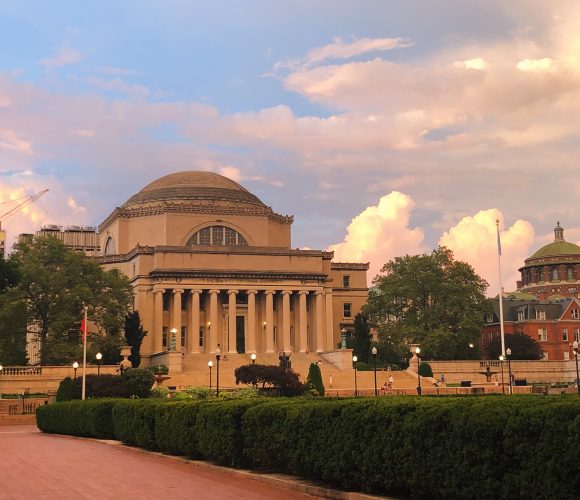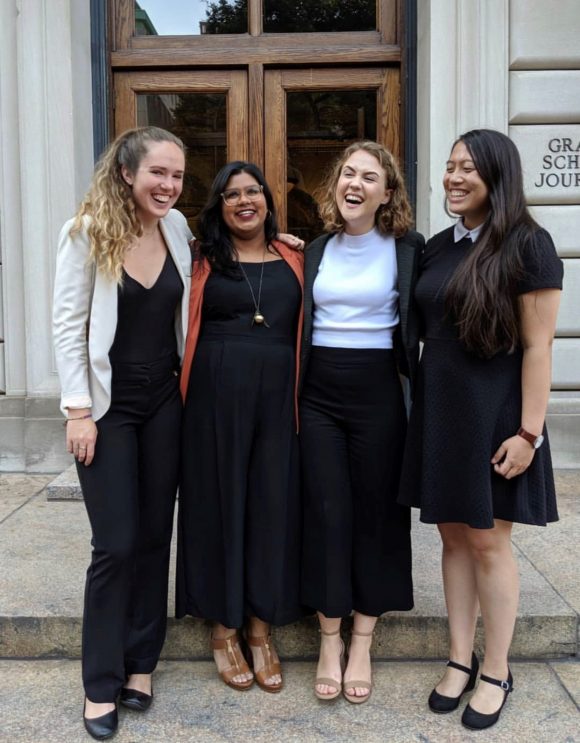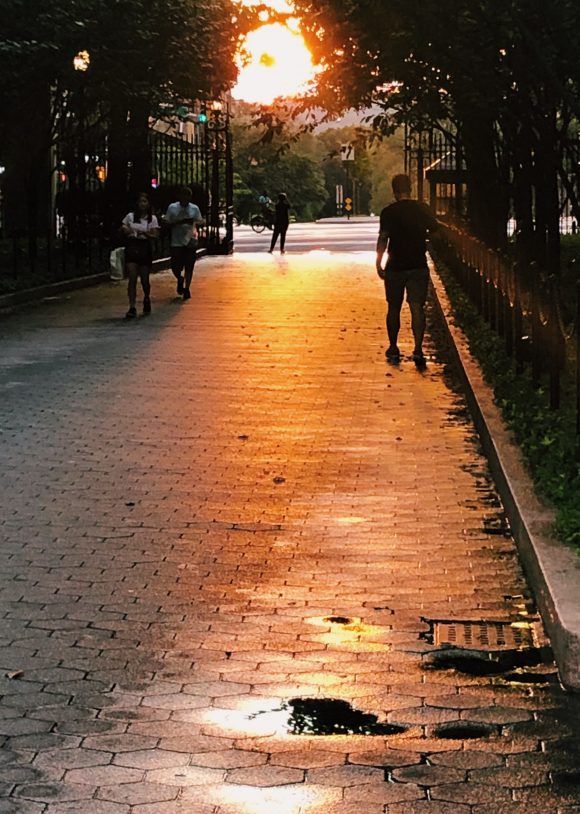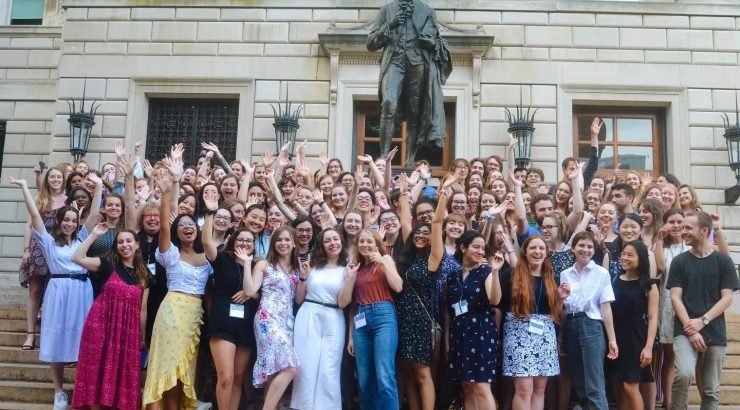Columbia Publishing Course Savanah Janssen's (BA English '19, MA English '20) Summer in NYC
September 4, 2019
As an English major, there is no clear path for what to do after graduation. Both in my undergraduate and now graduate career, one of the most common questions I am asked is “What will you do with a degree in English literature?” In the spring of this year, I began to seriously wonder that myself. I had begun applying to editorial internships and jobs at various magazines, newspapers, and online media companies, thinking that working at one of these would be a good experience for the summer before my last semester of graduate school—the last summer before I entered the long-avoided “real world.” However, after applying to twenty plus internships and not hearing back, I began to feel discouraged. I felt like my resume and cover letters were adrift in the endless void of the interwebs. I was losing hope of an internship and growing increasingly afraid that maybe everyone who had questioned my decision to study English literature was right. What if I couldn’t find a job in this subject that I loved? What would I do after graduation?
As a girl from Hawaii without an Ivy League degree, I was feeling very un-connected and outnumbered in the competitive job market—even though I have previous experience as a writer and editorial intern, as an editor at Chapman’s Calliope, and have a high-achieving career in both graduate and undergraduate work. (Side note: this is not me bragging about my achievements. I merely want to showcase how competitive the job market is). In short, I have thoroughly enjoyed my time at Chapman and am so grateful for the connections with professors and peers that I have made. Still, I began to wonder if all that I had worked so hard at in hopes of preventing joblessness after graduation would actually be enough to get me a job. Long story short, my confidence was shot and I did not know what to do.
In March, something changed. I attended the Festival of Authors put on by The Literary Women of Long Beach as one of eight selected Emerging Writers. I was invited by Chapman’s incredible Dr. Jan Osborn of the Rhetoric Department. While the conference was meaningful in and of itself, the best part was that each Emerging Writer was paired with one of the speakers, each a distinguished female author. I was paired with Amy Bloom, author of White Houses. I was so nervous to be talking with a real writer but also thrilled to pick her brain for career and writing advice. As someone who wants to write, I asked her what I should pursue postgrad. Her first question was, bluntly, if I was rich. I said no. She explained that if I were rich I shouldn’t work at all but spend all my time writing. As this was not an option—I’m financially independent and have got to make money for adulting things like student loans, rent, food, a 401k, etc.—she recommended something else: the Columbia Publishing Course.
The Columbia Publishing Course (CPC) is a six week program at Columbia University in New York. It acts as an intensive introduction to all aspects of book, magazine, and digital publishing. Since its inception 70 years ago (as the Radcliffe Publishing Course) CPC been recognized as the premier training ground for those aspiring to work in publishing. Through daily lectures from prominent people in the industry and or retired publishing legends as well as the two intensive workshops, CPC gives students experience for entry-level publishing jobs in any and all departments, be it marketing, editorial, publicity, design, sales, foreign rights, etc.
Over our lunch of salad and cake, Amy Bloom advised me to apply to the program. She said that I can, and always should, write. But to make ends meet, I should also do something that will further my career in a tangible way. In her opinion—one that I have come to vastly agree with—getting your work published often depends on the connections you have. After my unsuccessful experience applying to competitive internships, this struck a chord within me. After our conversation, I decided that I would try my luck at CPC. I’ve always thought that at some point in my life I would like to live and work in the big apple. Until this point it was a dream, a very ephemeral “what if.” From what the movies showed, the publishing world of New York seemed pretty cool, too. In short, to misquote Audrey Hepburn, I began to think that “New York is always a good idea.” The next week I applied. The next month, I got a phone call at 7:00 am from a New York number. I got in. Excited and curious, a couple of weeks later on a plane to JFK International Airport, embarking on what would be one of the most meaningful summers of my life thus far.
Beyond the experience of just being in New York for the summer—the magic of long summer days, pink sunsets, picnics in Central Park, the joy and terror of getting completely soaked by many an afternoon thunderstorm—the class at Columbia was incredible and unforgettable.
What follows is a detailed run down of what my CPC experience was like, as well as my pros and cons of doing the program.
As I mentioned above, the course itself is set up primarily as lectures. There are three speakers a day, often from different aspects of the industry like marketing, publicity, editorial, sub rights, etc. This means that most days we would be busy from around 9 am to 9 pm. There are also two workshops: one centered on books and the other on magazines. These workshops are each week-long intensive projects where we were split into groups and had to make all of the furnishing for pretend publishing houses and then pretend magazines, or what are now referred to as “brands.” While our publishing houses and brands were not actually real, they felt incredibly real while we were in them. These workshops are taken very seriously. Many a group experienced several stressed 4 am nights, some spotted with emotional breakdowns and fits of hysteria, most containing an excess of Oreos and for those of age, red wine. Beyond the occasional late night of writing and compiling, the workshops were a blast. Each member of the group was assigned a different role—CEO, editor in chief, editor, marketing, business, etc.—and would have different things they had to turn in by the end of each day. By the end of these intense weeks of collaboration we would submit the final “prospectus.” In the prospectus we had all the business, marketing, publicity, design, editorial, etc. plans for what could be real books and or real magazines, all prepared to a standard as if we were a real company. In these workshops we worked closely with, and were ultimately graded by, “faculty” from the industry. During these workshops I got feedback from, argued with, and ultimately, bonded with the heads of many a famous magazine and publishing imprint. Weeks after the program, it felt surreal to think that I had tirelessly edited copy, and even bickered, laughed, and befriended some of the biggest players in publishing. Pinch me. Overall, these workshops were great. From them I learned the details of how books and magazines are made and now I have beautiful, detailed finished products to bring to interviews in the future.
While the workshops were awesome, what I loved most about the course were the connections that I made. Our class became super close, even though there were about 100 of us. The workshops, many lectures, the stress and the fun, had bound us tight. All of us wil

l surely vouch for each other as we continue to get jobs in the industry. Beyond friendships and good peer connections, I also met a lot of people high-up in the industry. We had CEOs and other higher-ups of Simon & Schuster, Grove Atlantic, Penguin Random House, Hachette Book Group, Bon Appetit, The New York Times, and on and on come and speak to us and meet us after lecture. As a result, I now have several people I can confidently email once I finish my master’s in December and am beginning my job search. That feels wonderful.
I also learned important logistical information. There are so many details about the industry that I would not have known otherwise: how it works, the type of resume and cover letter HR managers are looking for, interview tips, the language of publishing, and very niche skills such as writing jacket copy, filling out a profit and loss statement, how to find comparative titles, etc. In short, I feel much more prepared for a publishing job, or firstly, for applying to publishing jobs.
Additionally, while CPC doesn’t line up directly with my ultimate goal to be a writer, I did learn a lot of things that will also benefit my writing career. I would urge those who are committed to writing to first follow Amy Bloom’s advice and if you can afford it, spend all your time writing. If however, you are like me and looking for a career in line with something in the literature field while continuing to write on the side, perhaps publishing is a path to pursue. During the course, everything we learned about I considered from both a publishing perspective and from that of a prospective writer—that itself was a meaningful experience. While CPC won’t help you directly with writing, it did teach me about the process, about agenting, and introduced me to actual people who could help me to get my work out there someday—fingers crossed.

I could rave about the perks of CPC—the quality of the program, the connections, the fact that I now have access to an exclusive email listserv that sends CPC graduates job openings directly, sometimes before they are even announced publicly or posted on company websites—there is one very real con to program. Bluntly, it costs so much money. This year, the final cost for the program (including housing in the dorms, the meal plan, the tuition, etc.) was $8,575. That is without airfare to and from New York, food on the weekends (the dining hall is only open on weekdays), and transport around the city (the program does not include a subway card). It is pricey, to say the least. In this way, CPC specifically, and by extension publishing at large, is very gate-kept in that those who can afford it are the ones who go to the program, and potentially, the ones who get the jobs. Many people who spoke to us said they hire mostly, sometimes exclusively, CPC graduates—again, this industry is problematically gate-kept. I got a grant from Chapman, a scholarship from Columbia, and used my graduation money to go to CPC. I am grateful that I was able to pull it off but I can’t help but think of all the qualified candidates who weren’t able to go due to finances, and who may not get jobs as a result. This is obviously problematic. There is way more that can be said on the subject, especially if you also consider the overall lack of representation in the industry for people of color, minorities, the LGBTQIA+ community, etc. I digress. This is definitely a detracting factor to CPC, and publishing at large.
Despite the exclusiveness of the program and the industry at large, I enjoyed CPC and found it ultimately rewarding. I cannot say how and if it will help me in my career—I have not yet begun my job search—but it has provided me with direction. I now have a plan for post-grad, a community of friends in New York, new insight as a writer, and a network I can use while I am looking for jobs. In this way, CPC became exactly what I was looking for. All the aimless applications, rejection, and doubt of last spring feels lessened. I am hopeful and excited about my career, and now have skills and a community to help me. The summer that I was dreading and the scary void that was the future became something to smile about. For that, I am grateful.


